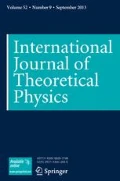Abstract
It is shown that for a given set of correlations either in a classical or in a quantumprobability space both the classical and the quantum probability spaces areextendable in such a way that the extension contains common causes of thegiven correlations, where common cause is taken in the sense of Reichenbach'sdefinition. These results strongly restrict the possible ways of disprovingReichenbach's common cause principle and indicate that EPR-type quantumcorrelations might very well have a common cause explanation.
Similar content being viewed by others
REFERENCES
Belnap, N., and Szabó, L. E. (1996). Branching space-time analysis of the GHZ theorem, Foundations of Physics, 26, 989-1002.
Butterfield, J. (1989). A space-time approach to the Bell inequality, in J. Cushing and E. McMullin, eds., Philosophical Consequences of Quantum Theory, University of Notre Dame Press, Notre Dame, Indiana, pp. 114-144.
G. Hofer-Szabó, M. Rédei, and L. E. Szabó (1999), On Reichenbach's common cause principle and Reichenbach's notion of common cause, British Journal for the Philosophy of Science, to appear.
Rédei, M. (1998). Quantum Logic in Algebraic Approach, Kluwer, Dordrecht.
Rédei, M. (1997). Reichenbach's common cause principle and quantum field theory, Foundations of Physics, 27, 1309-1321.
Reichenbach, H. (1956). The Direction of Time, University of California Press, Los Angeles.
Salmon, M. H., et al. (1992). Introduction to the Philosophy of Science, Prentice-Hall, Englewood Cliffs, New Jersey.
Szabó, L. E. (2000). Attempt to resolve the EPR-Bell paradox via Reichenbach's concept of common cause, International Journal of Theoretical Physics, 39, 911-917.
Van Fraassen, B. C. (1989). The charybdis of realism: Epistemological implications of Bell's inequality, in J. Cushing and E. McMullin, eds., Philosophical Consequences of Quantum Theory, University of Notre Dame Press, Notre Dame, Indiana, pp. 97-113.
Author information
Authors and Affiliations
Rights and permissions
About this article
Cite this article
Hofer-Szabó, G., Rédei, M. & Szabó, L.E. Common Cause Completability of Classical and Quantum Probability Spaces. International Journal of Theoretical Physics 39, 913–919 (2000). https://doi.org/10.1023/A:1003643300514
Issue Date:
DOI: https://doi.org/10.1023/A:1003643300514



